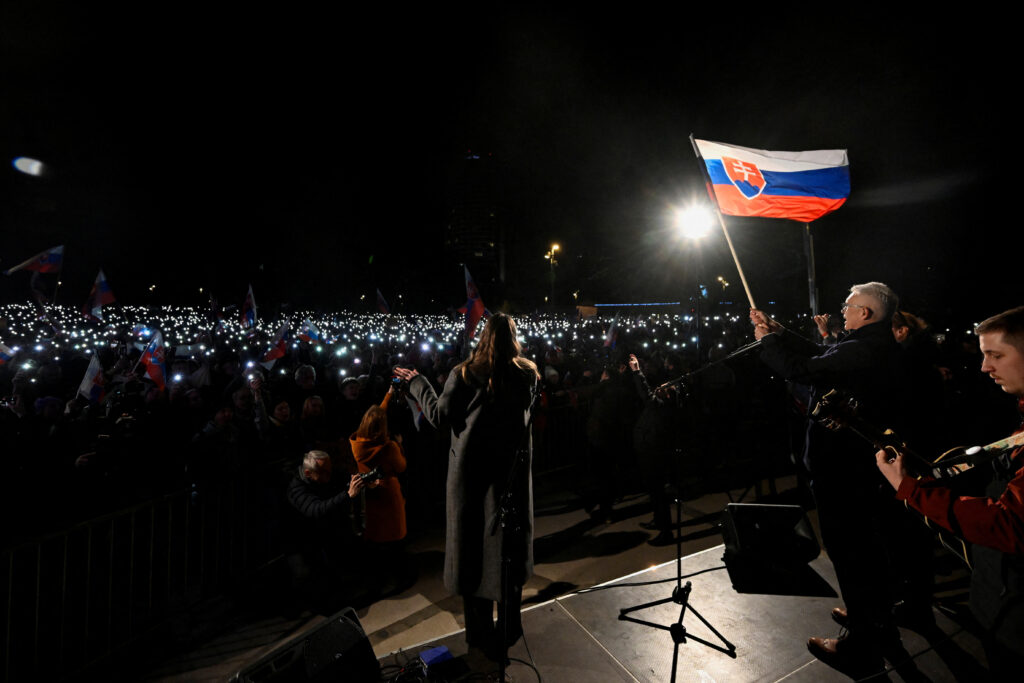Since the establishment of direct presidential voting in 1999, Slovakia has experienced a wide variety of electoral dynamics, but the presidential election of 2024 stands out for its unprecedented developments. As the country heads towards the second round on April 6, the choice between populist Peter Pellegrini and pro-Western career diplomat Ivan Korčok reflects deeper currents within Slovak politics and society.
What happened in the first round?
In September’s parliamentary elections, Slovakia’s voters elevated populist Robert Fico’s party to power in the National Council. But voters did not continue the trend in March. In a surprising turn of events, the first round placed Korčok, the former minister of foreign affairs, in first place with 42.5 percent of the vote, surpassing Pellegrini, the charismatic speaker of the National Council and leader of the center-left but anti-European Union (EU) Voice–Social Democracy party, who secured 37 percent.
Voter turnout reached 51.9 percent, showing increased participation compared to previous years. Based on polls and decreasing engagement from the public, many analysts expected this election’s turnout to be low. Consequently, as Fico and Pellegrini’s voters have been more engaged and active recently, Korčok was expected to finish behind Pellegrini. The results of the first round, however, indicate a heightened interest and underscore the importance of this election in the eyes of the Slovak public. Korčok earned almost 80,000 more first-round votes than outgoing president (and fellow liberal) Zuzana Čaputova did in 2019.
Ahead of the second round, Pellegrini is focusing on wooing nationalist-leaning voters, including the roughly 12 percent of voters who chose Štefan Harabin in the first round. Moreover, the candidates will compete to secure votes from the Hungarian minority, which makes up 7.7 percent of the population. With the leader of Slovakia’s Hungarian Alliance, Krisztián Forró, endorsing Pellegrini after earning nearly 3 percent of the vote in the first round, Korčok faces a difficult path toward victory.
What is at stake?
Slovakia stands at a crossroads, with the April 6 election not only determining its head of state but also sending a signal on the future direction of the country’s domestic and international alignments. Slovakia may reaffirm its commitment to European integration and democratic principles or embark on a divergent path reflecting growing populist tendencies within the region.
Pellegrini has emphasized his intent to focus on “national interests,” advocating for a Slovakia that resists the influences of Brussels and Washington. A member of Fico’s Euroskeptic coalition, Pellegrini has pledged to shield the nation from being embroiled in external conflicts and “dragged to war.” Pellegrini is also gradually aligning himself with Russia-friendly politics increasingly associated with Fico. His stance resonates with a segment of the population wary of international entanglements.
In contrast, Korčok represents a vision of a Slovakia aligned with Western democratic values and international cooperation, potentially providing a counterweight to the current Fico government. Korčok, whom Čaputova endorsed last year, is viewed by many as a continuation of her liberal, pro-EU leadership. His unexpected lead in the first round signals a potential shift in public sentiment, challenging the populist rhetoric pushed by the Fico government and presenting a contrasting paradigm of governance and foreign policy.
While the position is largely ceremonial, the president can veto any legislation coming out of the National Council and holds powerful influence over the direction of the public policy discussion. With Pellegrini as president, Fico would have more freedom to pursue his pro-Russia policies, setting Slovakia on a path similar to that of Viktor Orbán’s Hungary. On the other hand, a Korčok presidency would represent a counterweight to Fico’s coalition and could play a critical role in promoting a pro-West Slovakia and shaping issues such as aid to Ukraine or alignment with the EU.
Patrik Martinek is a visiting fellow at the Atlantic Council’s Europe Center from the Ministry of Foreign Affairs of the Czech Republic.
Emma Nix is an assistant director at the Atlantic Council’s Europe Center.
Image: Presidential candidate Ivan Korcok with Slovak's national flag waves at supporters from the stage during the election campaign rally, ahead of Slovakia's presidential election in Bratislava, Slovakia, March 19, 2024. REUTERS/Radovan Stoklasa
